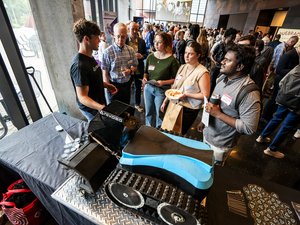
When Software for Good founder and CEO Casey Helbling decided to build a business around working for the public good, he didn’t realize he’d stumbled upon a growing business sector. More than a decade later, he sees many young startups defining their business ambitions by the positive impact they can have on society and the environment.
“Maybe it’s cliche, but it does feel like millennials do care more about what they’re doing with their careers and the businesses that they start versus just doing a thing,” he said. “Now there’s an emphasis on what is that thing really doing in the world and is it making the world better?”
Social enterprises are for-profit businesses with a mission more akin to nonprofit work. One group taking credit for helping develop the sector, Social Enterprise Alliance, formed in 1998. It defines a social enterprise as a company that provides opportunities for people who otherwise face barriers to employment, provide products or services that have a positive impact, and organizations that give some of their profit to good causes. The alliance reported noticing a rise in attention and interest in the sector from investors, consumers, media and policymakers in the last decade.
Two years ago, Minnesota created a corporate designation for companies in the state wanting to wear their mission on their sleeve. Software for Good is a public benefit corporation in the state. In addition to emphasizing the “for good” already in the company’s name, it requires annual reporting on its impact on society and the environment.
“It makes it really clear and easy for us to describe who we are,” Helbling said. “It matches our legal status with the way we run and operate our business.”
He’s not alone in the Twin Cities startup scene. The Office of the Minnesota Secretary of State lists nearly 80 public benefit corporations that filed annual reports on their mission and activities in 2017. About a dozen of those on the list are startups. In addition to Software for Good, the list includes well-known companies like Finnegans and Peace Coffee, as well as fresh faces like Mobility 4 All.
Software for Good reported doing more than $1 million in work for “mission-based projects,” including working with HousingLink to make the waitlist process for subsidized housing more transparent, with Arc Minnesota to build a tool that helps intellectually and physically disabled adults plan their future, and with Twin Cities Pride to provide a mobile app people could use to navigate the festival.
At the same time, its employees each logged an average of 210 PTO hours – or nearly four weeks off work.
Working for good poses some challenges, Helbling said. The company evaluates each project based on its priorities – people, planet, and profit – knowing not every project will hit all three perfectly. He said he tries to maintain a portfolio that keeps things balanced while doing as much good as possible.
“In some cases, being a social enterprise makes it easy to define your market. But in other cases, that market might be limiting,” he said. The best causes could come through clients with limited resources. “In some cases, we’ll do projects that miss profit. In other cases, we’ll do maybe something that’s a little more in the middle of the road.”
To him, it’s worth it to spend the extra time and energy evaluating the work and measuring his company’s impact. “At the end of the day, I feel better when I go home. I worked on a project that helped bring solar gardens into existence. I’m ok with doing a little extra work up front to have that opportunity.”








